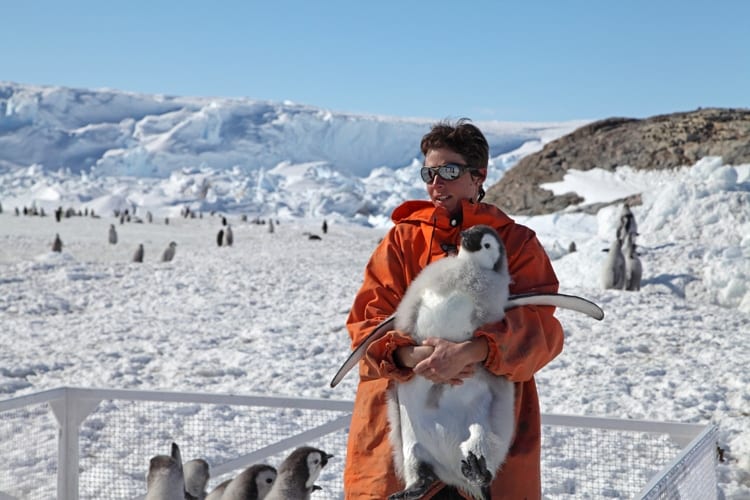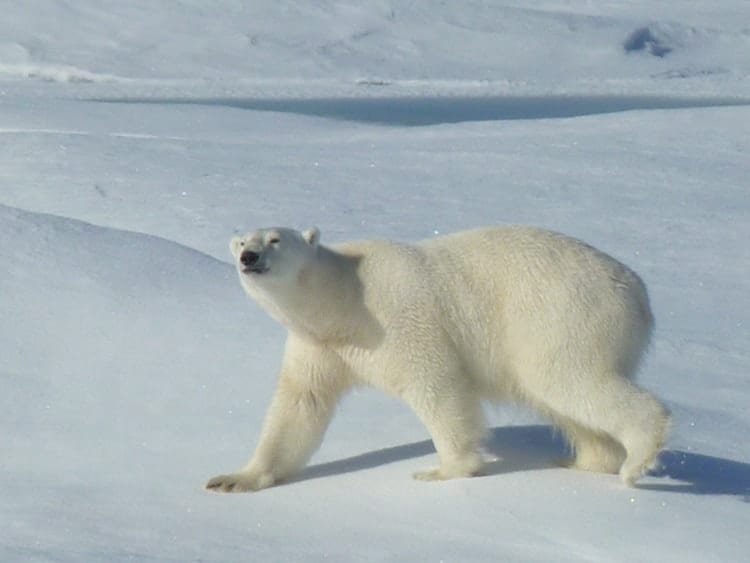WHOI Hosts Public Forum and Art Exhibit on Impacts of Climate Change to Polar Animals
April 22, 2014
No place on the planet is more vulnerable to climate change than the polar regions of the Arctic and the Antarctic. Warming waters and the loss of sea ice are affecting the habitat and food source for many polar species from penguins in Antarctica to polar bears in the Arctic. To discuss these issues, leading scientists in the fields of polar research will convene at Woods Hole Oceanographic Institution (WHOI) for a scientific workshop that will also include a free public event and art exhibit.
“This is an exciting project for me because of the science, and the potential impact on society,” said Stéphanie Jenouvrier, WHOI Assistant Scientist and organizer of the colloquium. “Developing conservation strategies for climate change is a big challenge that requires a strong network of international collaborators.”
To bring this subject to the public’s attention, polar scientists and policy makers assembled for the conference will present their latest research and conservation policies at a public forum, “From Penguins to Polar Bears: Impacts of Climate Change” on Sunday, May 4, 2014 from 6:30 to 8:00 p.m. at WHOI’s Redfield Auditorium located at 45 Water Street in Woods Hole, Mass.
The forum is part the Morss Colloquium series at WHOI aimed to heighten awareness and promote understanding among our community about the serious global problems confronting the human race today. The event is free. Seats may be reserved online at www.whoi.edu/main/penguinspolarbears.
The presentations will include:
- “Impact of Climate Change and Other Human Pressures on Polar Ecosystems” by Scott Doney, Director of WHOI’s Ocean and Climate Change Institute
- “The Power of Photography in Telling Science Stories” by Chris Linder, WHOI Research Associate
- “Polar Wildlife Threatened by Climate Change – How Can We Help?” by Shaye Wolf, Climate Science Director at the Center for Biological Diversity
- “Connecting Science and Decision Making under the Endangered Species Act: The Case of Polar Bears” by Lynn Scarlet, Co-director at the Center for the Management of Ecological Wealth
- “Polar Bears, Science, and Uncertainty” by Hal Caswell, WHOI Senior Scientist
“Climate in the Arctic and along the western Antarctic Peninsula is changing rapidly, and we are already seeing major shifts in polar species’ populations and invasions of species from warmer, subpolar regions,” said Scott Doney, Director of the Ocean and Climate Change Institute at WHOI, who will moderate a Question & Answer session following the presentations. The program will be webcast live for those unable to attend.
The public forum will be followed by two days of closed meetings for the scientists and policy makers to delve into data and to strategize about conservation policies.
“The aim of this is to move beyond borders for conservation,” said Jenouvrier, who has been researching the population trends of Antarctic seabirds such as the Adélie penguin for over a decade. “We need a new paradigm of global cooperation and need to move quicker to mitigate the impacts of climate change on polar seabirds and other animals.”
To highlight the themes of the forum and scientific meeting, a related art exhibit will be on display at the Woods Hole Community Hall, 68 Water Street in Woods Hole, Mass. The exhibit features watercolor paintings by Aurélie Lebrun du Puytison and photographs by Chris Linder of animals imperiled by climate change in Arctic and Antarctic regions. The exhibit is free and will be open Sat., May 3 from 11 a.m. to 4 p.m., Sun., May 4 from 11 a.m. to 6:30 p.m., and Sat.-Sun., May 10-11 from 11 a.m. to 4 p.m.
Jenouvrier says she was inspired to assemble experts in this field in order to help advance the science and public policy discussion.
“It is imperative to develop a common, global understanding among international collaborators so we can better understand and predict the effects of climate change at the species level and move forward together,” she said.
This colloquium is funded from a generous gift by Elisabeth W. and Henry A. Morss, Jr., the Ocean Life and Ocean and Climate Change Institutes, as well as the Marine Mammal Center and the Marine Policy Center at Woods Hole Oceanographic Institution.
The Woods Hole Oceanographic Institution is a private, non-profit organization on Cape Cod, Mass., dedicated to marine research, engineering, and higher education. Established in 1930 on a recommendation from the National Academy of Sciences, its primary mission is to understand the ocean and its interaction with the Earth as a whole, and to communicate a basic understanding of the ocean’s role in the changing global environment. For more information, please visit www.whoi.edu.


